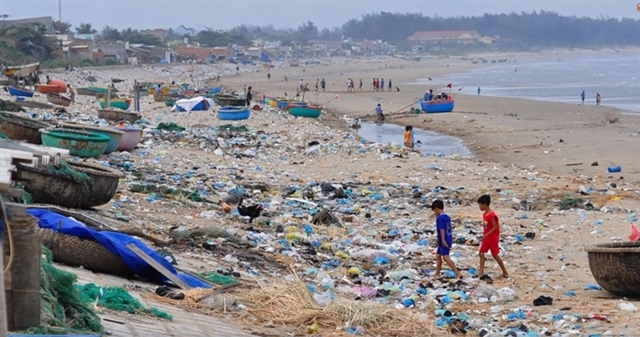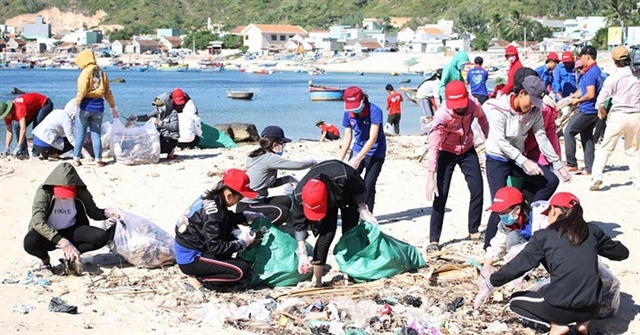Experts say it is time for agencies to join hands to reduce plastic rubbish and target green and sustainable tourism.
Lê Hương
Millions of tourists each year are creating an enormous amount of plastic rubbish, harming the environment and the country's wider ecology.
Experts say it is time for agencies to join hands to reduce plastic rubbish and target green and sustainable tourism.
Plastic rubbish at tourist sites is increasing rapidly, according to the Institute for Tourism Development Research and World Wild Fund.

A beach full of plastic waste is not a rare scene in Việt Nam. VNA/VNS File Photo
In Hạ Long Bay, about four tonnes of rubbish is thrown away each day, mostly plastic into the sea, while Sầm Sơn Beach gets 105 tonnes of rubbish each day, about a quarter of which is plastic.
Overall in Đà Nẵng, there is about 1,100 tonnes of rubbish each day, with 17 per cent being plastic. In Tuy Hòa in Phú Yên Province, plastic accounts for 524 tonnes of rubbish each day, and Phú Quốc Island has 155 tonnes.
Nguyễn Thị Ngọc Ánh, from the Ministry of Natural Resources and Environment, said each tourist discards nearly 10 plastic bags each day, and up to four plastic bottles or boxes.
Ánh said the amount of plastic rubbish accounts for 10-12 per cent of daily solid waste, especially in cities with many tourists.
A report from the UN Environment Programme (UNEP) in 2018, showed Việt Nam was one of the countries with the most plastic discarded into the sea, up to 730,000 tonnes per year. This accounts for about 6 per cent of the total plastic in the sea.
The nation ranks fourth among plastic polluters of oceans worldwide.
Vũ Quốc Trí, office manager of the Viêt Nam National Tourism Administration, said that plastic rubbish has a negative effect on tourism.
“Reducing the effect of this is the duty of tourism workers,” he said.
Nguyễn Thị Thu Huyền, national coordinator of the UNDP’s Global Environmental Facility Small Grants Programme, said Việt Nam tourism needed a concrete plan on reducing rubbish and that other sectors had succeeded in this regard.
“Việt Nam must join international activities in the fight against rubbish globally to concretely build a global convention on reducing plastic in oceans in the next few years,” she said.
Sustainable tourism
The Vietnamese Government has issued many legal documents to reduce plastic in tourism.

Young volunteers clear rubbish on a beach in central Việt Nam. Photo moitruongdulich.vn
Vietnamese tourism aims to “develop tourism in a green, sustainable way, taking environmental respect as a principle and a priority to ensure tourism development and preservation. It must also bring into play the values of natural resources, making contributions to solving social problems, while protecting the environment, and effectively responding to climate change.”
Several government decisions are now focused on reducing single-use plastic products. By 2025, tourist sites and hotels must not use any single-use plastic products or difficult-to-dissolve plastic bags.
The Ministry of Culture, Sports and Tourism has issued a guideline on protecting the environment at tourist sites with clear guidance on reducing plastic.
"With the support of the UNDP and the UNEP, the Vietnamese tourism agency has co-operated with the Institute for Strategy and Policy to implement various projects for reducing rubbish in tourism throughout the country," Vũ Thế Bình, chairman of the Viêt Nam Tourism Asociation, said.
Such projects include many activities, especially communications, to enhance the awareness of people, sectors, enterprises, and tourists to limit plastic use.
“Some solutions to cut plastic use have been trialled in numerous restaurants, hotels and tourist destinations in the provinces of Ninh Bình and Quảng Nam,” Bình said.
"A standard criteria set to recognise 'non-plastic tourism enterprises' has been drafted and applied in some trial areas. We aim to publish an action plan for reducing waste in tourism as well as create a number of apps on managing plastic use.”
Experts have also discussed how to improve the rubbish classifying system, collecting, and recycling plastic waste that is suitable for tourism development. They suggest producers recall, recycle and reduce discarded bottles in the environment.
Strict fines have also been recommended for littering. VNS